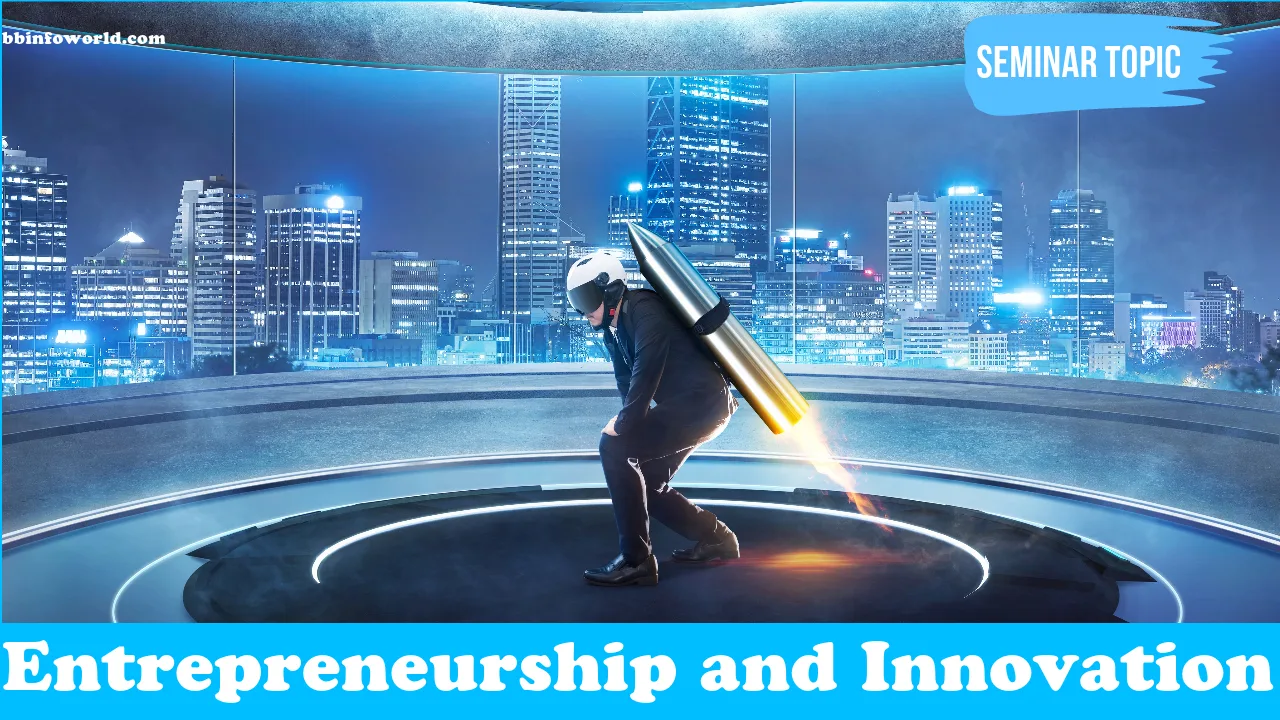
Entrepreneurship and Innovation
Discover the principles of entrepreneurship, innovative thinking, and how to turn ideas into successful ventures, fostering an entrepreneurial mindset.
Entrepreneurship and Innovation:
Entrepreneurship and innovation are integral drivers of economic growth, technological advancement, and societal progress. They encompass the creation of new businesses, products, services, and solutions that address unmet needs and drive positive change. This comprehensive explanation explores the core concepts, principles, and benefits of entrepreneurship and innovation.
Understanding Entrepreneurship:
- Definition: Entrepreneurship refers to the process of identifying opportunities, taking calculated risks, and organizing resources to create and operate a new business venture.
- Entrepreneurial Mindset: At the heart of entrepreneurship is an entrepreneurial mindset, characterized by creativity, adaptability, resilience, and a willingness to embrace uncertainty.
- Types of Entrepreneurs: Entrepreneurship takes various forms, including small business entrepreneurship, social entrepreneurship (addressing social and environmental challenges), and technology-driven startup entrepreneurship.
Importance of Innovation:
- Defining Innovation: Innovation involves the creation, development, and implementation of novel ideas, products, services, or processes that result in significant improvements or advancements.
- Driving Forces: Innovation drives competitiveness, efficiency, and market differentiation. It fuels technological progress and improves the quality of life by solving problems and enhancing experiences.
Key Aspects of Entrepreneurship and Innovation:
- Identifying Opportunities: Entrepreneurs identify gaps in the market or unmet needs and develop innovative solutions to address them. This may involve improving existing products or creating entirely new ones.
- Risk-Taking: Entrepreneurship involves calculated risk-taking, where individuals invest time, resources, and effort in pursuit of potential rewards. It requires managing and mitigating risks while embracing uncertainty.
- Business Planning: Entrepreneurs develop comprehensive business plans that outline their vision, target audience, value proposition, revenue model, and growth strategies.
- Funding and Capital: Acquiring funding is a crucial step. Entrepreneurs explore various sources, such as personal savings, angel investors, venture capital, and crowdfunding, to finance their ventures.
- Execution and Implementation: Innovators translate ideas into action, turning concepts into tangible products, services, or processes through iterative development and refinement.
Principles of Entrepreneurship:
- Identifying Opportunities: Entrepreneurs keenly observe the market to identify unmet needs, gaps, or problems that can be addressed with innovative solutions.
- Innovation and Creativity: Entrepreneurs seek novel ways to solve problems, often disrupting traditional approaches with innovative products, services, or processes.
- Risk-Taking: Entrepreneurship involves calculated risk-taking, where individuals assess potential challenges and rewards before making decisions.
- Resource Management: Entrepreneurs efficiently allocate resources like time, capital, and manpower to maximize the value they create.
- Customer-Centric Approach: Successful entrepreneurs prioritize understanding their target audience, listening to feedback, and adapting their offerings based on customer needs.
Innovative Thinking:
- Divergent Thinking: Entrepreneurs employ divergent thinking to generate a wide range of creative ideas and solutions, often by connecting seemingly unrelated concepts.
- Problem-Solving Mindset: Innovative thinkers view challenges as opportunities, approaching problems with curiosity and a desire to find unique solutions.
- Cross-Disciplinary Approach: Entrepreneurs draw insights from various fields and industries, combining knowledge to create groundbreaking solutions.
- Iterative Process: Innovative thinking involves continuous refinement and improvement of ideas through feedback and iteration.
Turning Ideas into Successful Ventures:
- Idea Generation: Entrepreneurs brainstorm and generate ideas that address identified market gaps or problems.
- Market Research: Rigorous market research helps entrepreneurs validate the demand for their idea, assess competition, and understand customer preferences.
- Business Plan Development: Entrepreneurs create a comprehensive business plan that outlines their value proposition, target market, revenue model, marketing strategy, and financial projections.
- Prototyping and Testing: Entrepreneurs develop prototypes or minimum viable products (MVPs) to test their ideas and gather user feedback.
- Iterative Refinement: Based on feedback, entrepreneurs refine their offerings, iterating on their prototypes to create a more polished solution.
- Funding and Resources: Entrepreneurs secure funding through various means, such as bootstrapping, angel investors, venture capital, or crowdfunding.
- Go-to-Market Strategy: Entrepreneurs devise a strategy to launch their product or service, including pricing, distribution, and promotional efforts.
- Continuous Learning: Successful entrepreneurs embrace a growth mindset, continuously learning from successes and failures to adapt and innovate further.
Fostering an Entrepreneurial Mindset:
- Creativity and Problem-Solving: Entrepreneurs and innovators approach challenges with creative thinking, seeking unconventional solutions and considering diverse perspectives.
- Adaptability and Resilience: They embrace change and learn from failures, demonstrating resilience and adapting their strategies based on feedback and evolving circumstances.
- Continuous Learning: Lifelong learning is essential. Entrepreneurs stay updated on industry trends, emerging technologies, and market dynamics.
Benefits of Entrepreneurship and Innovation:
- Economic Growth: Entrepreneurship drives economic growth by creating jobs, fostering competition, and stimulating innovation-led industries.
- Technological Advancement: Innovation pushes the boundaries of technology, leading to breakthroughs in medicine, communication, energy, and more.
- Societal Impact: Entrepreneurs and innovators address social challenges, such as healthcare access, environmental sustainability, and poverty alleviation.
Innovation Ecosystem:
- Education and Research: Academic institutions play a role in fostering innovation through research, education, and technology transfer.
- Incubators and Accelerators: These provide resources, mentorship, and networking opportunities for startups to grow and succeed.
- Collaboration and Networking: Entrepreneurs collaborate with industry partners, mentors, investors, and peers to share ideas and resources.
Conclusion:
Entrepreneurship and innovation are dynamic forces that shape economies, industries, and societies. They require a blend of creativity, strategic thinking, determination, and adaptability. By fostering an entrepreneurial mindset and embracing innovative thinking, individuals and organizations can drive positive change, create value, and contribute to a brighter and more prosperous future.



